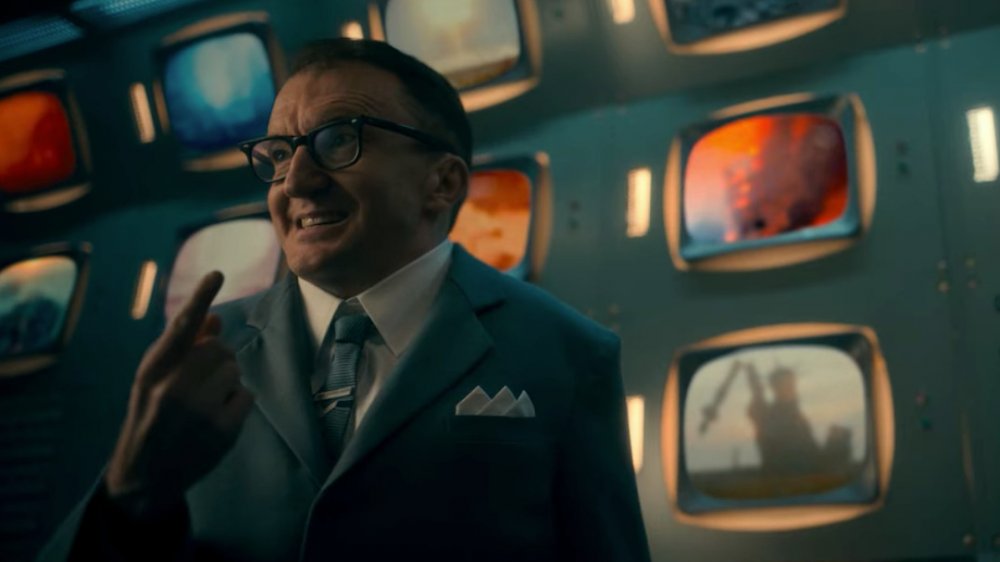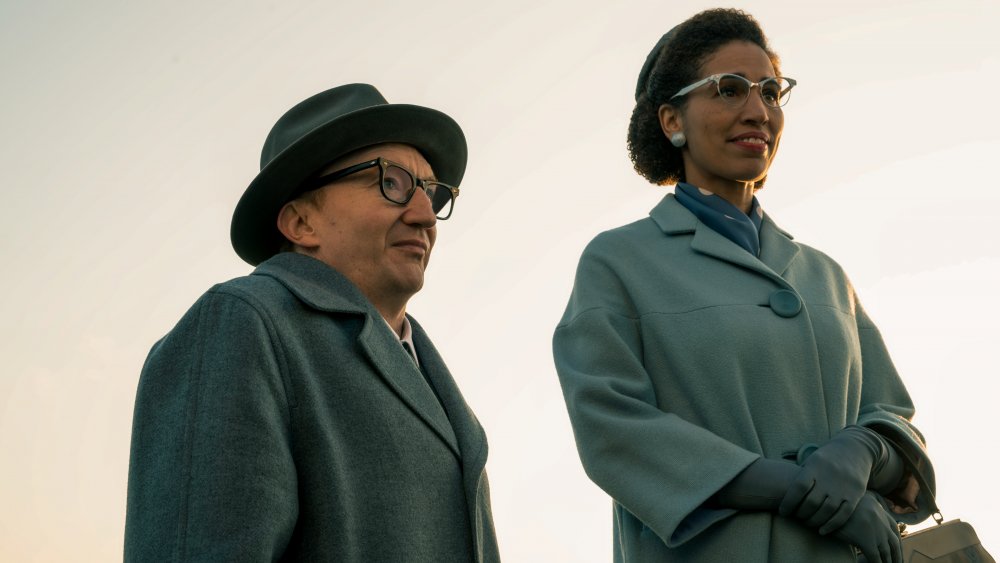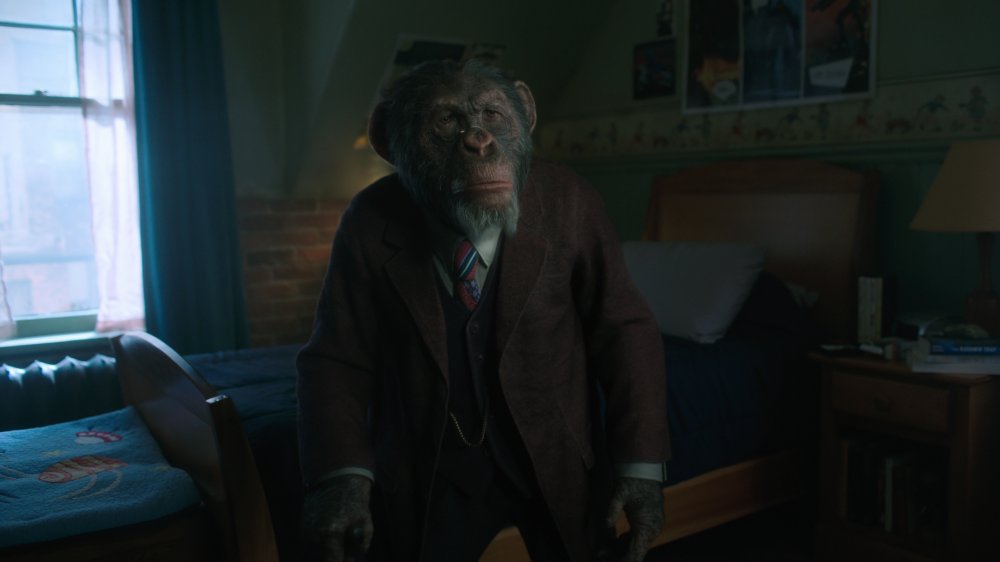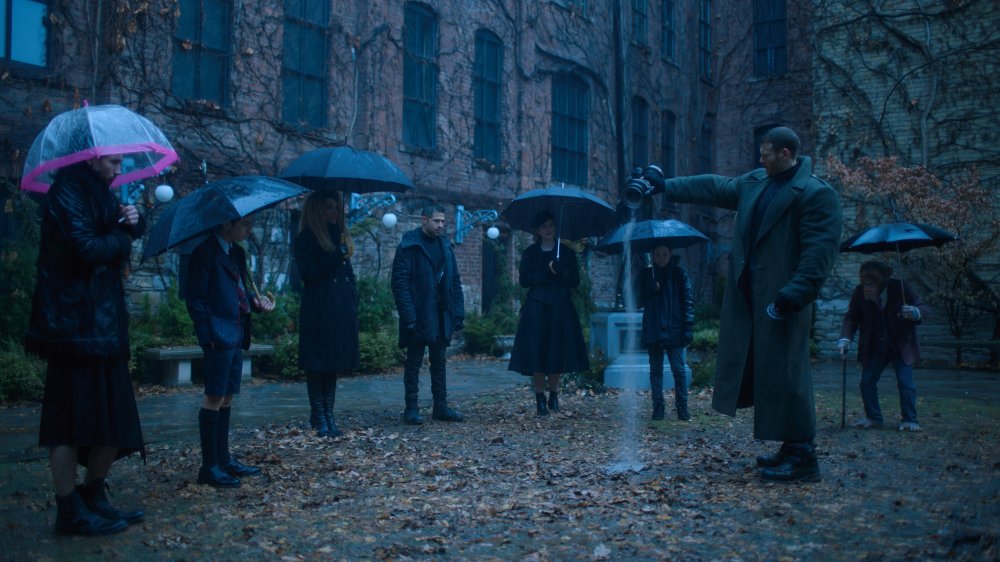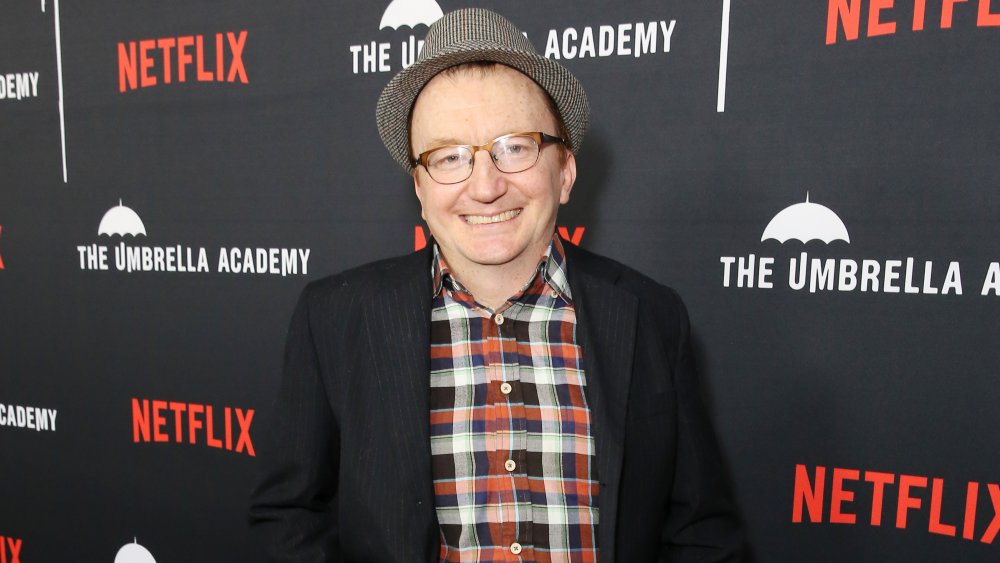The Umbrella Academy's Ken Hall On Bringing Pogo And Herb To Life - Exclusive Interview
Actor Ken Hall played a big part in the proceedings of The Umbrella Academy's first season, but you only saw his face onscreen briefly. That's because the majority of his work was as the performance capture artist for Pogo, the hyper-intelligent chimpanzee who served as majordomo to Reginald Hargreeves and surrogate parent to the adopted Hargreeves siblings. While the character, a completely CGI creation, was an emotional crux for the titular academy, his demise near the end of the season might have left one wondering whether we'd seen the last of Hall's work on the show.
Thankfully, that's proven not to be the case, as season 2 has viewers seeing a lot more of this experienced improvisational and comedic actor. His portrayal of Herb, a Commission bureaucrat who butts heads with the Handler and serves a key role in the Hargreeves' struggles against the apocalypse, is one of the season's more pleasant surprises, taking a character who made only a single appearance in the first season and giving him added weight and dimension, not to mention a hefty dose of comedic sensibility.
With The Umbrella Academy's second season having arrived and furthered the world-saving adventures of everyone's favorite dysfunctional super-siblings, Looper sat down for a chat with Hall about Herb's evolution, the process of bringing Pogo to life, and his favorite moments on the Umbrella Academy set.
Ken Hall on Herb's expanded season 2 Umbrella Academy role
Season 2 is here. What was it like this time, being onscreen without the CGI? Herb showed up in season 1, right, briefly?
I did, yeah. So I'm playing basically two roles. In the first season, I played the body of Pogo, and in episode 6, I got to play Herb, which was a very small role, but it was great, and it was a comedic role as well, which is more my background. And the showrunner, Steve Blackman, really loved it. He said "Man, that was laugh-out-loud funny." From that, in season 2, without getting into things, yeah, Herb is back as part of the Commission. And so yeah, it's really lovely to be able to see and experience the show from two different perspectives.
How was it having a more expansive role for Herb this season?
He's a character that I can really identify with. He's good at what he does, and he's got a bit of a nervous disposition to him, but I think he wants to do a good job. For me, I appreciate the writing that went into making Herb happen in this season. A lot of it is very comedic-based, which, again, is more of my background in improv and clown and comedy and such. So I really feel like I get to play with my strengths. And again, it's just a real pleasure to work in such a cool facet of being part of the Commission and monitoring the space-time continuum and things like that. I just feel like it's such a great angle and such a cool way to play it that it's a very bureaucratic entity that oversees all of that stuff.
The Commission is such a mysterious organization. Is there some sort of Commission Bible that they give those of you involved in that aspect of things, so you can understand what's going on there?
Not per se, but I think for myself, I have a good sense of where I fit into the cogs within the machine of the Commission, what the mission is and all the moving parts within it, and how that comes to be. And I love the feel of it, as well. It's that very 1950s-esque... everyone is dressed in their suits and immaculate. If this was real life, I don't know how comfortable I would feel working in such a strict environment, where there are all these very precise rules and regulations and not a lot of individuality. So, again, it's really fun to play the juxtaposition of who I am and how I see myself in real life being plugged into a fictional context that's very by-the-book.
Since you do have this improv background, do you get the chance to play on set? I would imagine with the Pogo stuff, it's all pretty scripted because they have to do a ton in post-production, but do you get the opportunity to bring your improv background to bear otherwise?
There certainly are moments when I get to riff on things, and I'm always thankful to be on a set working with directors and writers who say, "Great, let's get one in the can." And even what I was doing with Pogo too, as long as like the end version can be synced up with what Adam Godley does as the voice of Pogo, and it makes sense and it's in character, then absolutely. My experience with working with the different directors on Umbrella is that they seem to be very open to adding improv, because it's just an extension of the writing.
So yeah, there are a lot of moments when I get to riff and create stuff. Nothing is really as written in stone, and often the showrunner is very involved, too. It can be a really cool place to do brainstorming and do a lot of collaborative work in real time as you're figuring it all out, because it's this giant puzzle and each scene is different.
Is there an improvisational moment from either season that jumped out at you as a highlight?
With Herb, there are lots of really fun moments that I found doing some stuff on set, so I wish we were having this conversation a month from now. I tell you what, though, now that I think about it, in the first season, I had a very small part when they introduced Herb. It was a really funny dynamic, what we had in season 1, being domineered by Kate Walsh's energy and the character that she's playing, and my very nervous bumbling, trying to search for words, being very uncomfortable, being put under the microscope. We did many takes for that one small scene.
So there are many different versions of stuff that I tried out — wild lines, basically, and just playing with the physicality. What I got to do more this year is to play with the more physical comedy moments, this sense of the mannerisms of Herb. I think in season 1, there was a lot of improv that went into me trying to fumble for my lines in response to what Kate's character, to the Handler, what she was saying to me.
Pogo wasn't written to be a comedic character, so the improv within Pogo was more just honoring the moment and honoring the scene. It wasn't about getting a laugh, but I have a different focus when I'm playing Herb. I want to get that laugh.
Ken Hall on playing Pogo on The Umbrella Academy
You had done prosthetics work with People of Earth, but Pogo was the first motion capture thing you've done. What was that process like, stepping into that way of working for the first time?
It's a very different ballgame. With Jeff the Grey, it was about a two-hour build every time I was on set, and the prosthetic would cover my nose. So in essence, I was breathing through my eye sockets, which was a very weird experience, and the prosthetic went over my ears, so everything was muffled. It was harder to hear directions on set and anything from my scene partners, and it was really hot underneath.
With the motion capture stuff, it's like your suit is made to fit you. You put it on, and you're thinking, "Oh, this feels great. It fits like a glove." The ease with which I could move, and the comfort that I had, was very different from the prosthetics. It felt very comfortable, but embodying an elderly chimpanzee, who also has very human qualities, that was a cool challenge. So I'm learning this and then discovering more nuances of the movement that honors both how a chimpanzee actually moves and, I think, the character of a gentleman, this more parental affection movements, more thoughtful and considerate.
And of course, the age is older; he is geriatric in many ways. How to physical-ize that? A lot of it was learning as I went. I did some research in watching, studying how chimpanzees move, but again, I'm not a full chimpanzee, because I'm this humanized chimpanzee. So there are a lot of human qualities. He walks with a cane, and he smokes a pipe. So again, doing some research, but also allowing myself to discover a lot when I was on set too, which was a cool experience.
Is it true that you did not see the fully realized character until attending the premiere?
Yeah, actually. That's true, because it wasn't in the playback. When you're on set, and you see a playback, I'm wearing this gray outfit with Velcro dots on it and animal gloves. Near the end of it, Steve Blackman, the showrunner, showed me a little bit more of what Pogo would be looking like, with more of the layers and more of the CGI. Still, it wasn't a finished version, but it was amazing, all the detail. So yeah, I guess at the end, it was really the premiere where I got to see everything, and it just blew me away. It was just visually so incredible.
How does that impact how you perform the character? You're going in not knowing anything other than the fact that you're probably going to look like a chimpanzee in some respects. How does that impact how you perform on set when you can't actually see how you're going to look ?
For me, I always wanted to show up prepared, because I knew going into it that it's not going to be my voice. It's going to be Adam Godley that's going to be voicing Pogo, but I want all my mannerisms down. I want to really feel like I'm that character. For my time on set, I am Pogo. It was really cool to hear that reflected in some of the other actors when they did show a sneak preview of the first episode. It really blew them away, and they were saying, "Oh yeah, it's not what Ken looks like." Even the cast got very familiar with what our version of Pogo was, which is a small guy with the hat and the cane.
So I really have to honor what is written for the character, and I'm going to bring it. I really worked with my acting coach, and even though it's not my voice, I'm going to give everyone my best performance. It was nice to hear that people really appreciated that I brought the real deal. When your character is half in, half out, you really have to fully embody that.
Pogo's actions stirred up some debate among fans between people who understand where he's coming from and people who didn't like what he was a part of. How do you view that?
Well, for me, I really love Pogo. I think he's a real loyal, gentle soul. I mean, as we all do, we make mistakes, but I think Pogo, at the end of the day, had everyone's best interests at heart. That's another reason why I really can relate to the character and really love the character, because I feel like he does have a lot of heart amongst a very toxic family. I think he wanted the best for everyone, for the kids, and he was that surrogate uncle. I feel like he was that parental figure in the kids' lives.
We have to do certain things, given our circumstances, that maybe down the road we would do differently or we would approach in a different way. We would be more honest. We would be more vulnerable. We would communicate in different ways. I feel like his loyalty to Reginald Hargreeves was a big driving force for him, and yet, at the same time, he was still acting as a caregiver for the family, and that presence that gave people a sense of safety and a sense of love.
Was it hard for you to see any negative fan reactions towards what Pogo did?
Well, in all honesty, I actually haven't seen a lot of the negative reaction, but it is what it is, and we're trying to honor the character that Gerard wrote. These are complicated characters. They're much more nuanced, and I feel like that reflects real life. I think that's actually one of the real selling points of the show, that it goes deeper into more relationships. It's certainly not just about superheroes. It's really much more than that, and I think life is complicated, and things are complex, and those relationships are complex. So, in some ways I think it's probably nice that it can be in some ways polarizing. It's not so clear cut. I think that's more real-life, you know?
Ken Hall's most memorable moments making The Umbrella Academy
You mentioned earlier bouncing off Kate Walsh. What was your experience working with the rest of the cast, particularly the Hargreeves siblings?
It was really cool to get to work with them. It's a lot of heavyweights up there, and everyone's so different as well, which is really nice. It was also actually a really nice surprise for me, after we had filmed it and everything, to read interviews from the other cast. I had an interview with a writer from Playboy who had reached out to me specifically because she'd heard so many great things that the other cast had been saying about me, working with me, and what I was saying earlier about really bringing it to set even though it's not going to be my voice. That was very touching and very moving, that I made an impact, and that even though it's not my voice at the end of the day, I still brought a sense of dedication to it, and real desire.
It was just really touching for me to hear people share that, because I didn't really know. I'm thinking, "I'm just going there, and I'll do my job," but it was really nice to hear that they really appreciated and really valued the work that I brought, even though, at the end of the day, it's just going to be more of my body from the shoulders down. That was a real beautiful cherry on top of the pretty tasty sundae, to have that impact. These are people that I look up to and really admire as performers. That was something that really stood out for me.
The show, as an end product, feels like a really big group effort, and it sounds like that was the vibe on the set as well. Would you say that's accurate?
Oh yeah, for sure. It's, again, one of the strengths of the show, and it is a family. It was all a real lovely vibe of going to work and getting to pal around with people and having some great conversations with Ellen [Page] or having some real ridiculous moments with Robert [Sheehan]. It was really a warm vibe. I remember the first read-through of season 2, and I went to that, but I was late because I had two auditions on the opposite end of town.
I was just a few minutes late, and they had locked the doors. This is the entire cast, it's all the Netflix people, producers — it's everyone involved in the show. It was a hundred people in this room, and I'm with one of the PAs that were knocking on the door, and we're trying to get in. It's a really high pressure situation. Someone finally came to open the door just as they were starting, and I came in, and everyone just cheered. That is such a wonderful memory. That just speaks to the energy and to the vibe of the show, and how welcoming I think people really are.
Were there any moments in particular, highlights, specifically on the set that you recall as the best moment?
There's one that stands out. It was actually my very first day in season 1. I was very sick with a cold, and then it developed into really bad bronchitis, to the point where I coughed and I thought I gave myself a hernia. I was in rough shape. This would have been mid- to probably late January here in Toronto. So it's cold, it's the middle of winter, and it was raining. It was raining all day, and it was an outdoor shoot. It was in the first episode. There's this big funeral scene outside, and not only was it naturally raining, but they had these giant sprinkler things to make the raindrops even bigger and better-looking.
I was just in my motion capture suit, but I was wearing three pairs of long johns. I had four sweaters on underneath just trying to stay warm. By the end of the day, I could barely even say my lines, because I was shivering so much. That was another experience. but it's one of those things. You do it, and it was such a great feeling of accomplishment. I've had some hard shoots, but that one really stands out to me just because you want to make a good impression, and you want to do good work, but it was the hardest conditions. I was on antibiotics. I just felt really terrible, but I survived it, and then I came back the next day. That was a huge accomplishment that I am very proud of
Being on a Netflix hit was a singular experience for Ken Hall
How was it experiencing the hit the show became, as someone involved in it?
It was really lovely. I mean, it's always nice to be working, but it's also exceptionally nice to be working on stuff that people really dig, and that people can really relate to as well. The first experience I had of that was with People of Earth. That was my first taste of it. At that time, it was like the biggest thing that I'd done. So, I already had two or three years of that experience, but for Umbrella Academy, and as part of something for Netflix, it was really cool.
I remember going the the opening down at the Cinerama Dome in L.A., on Sunset Boulevard. I got out of the vehicle and onto the red carpet, and all the cameras were there. It's just, again, very surreal to be part of this, and to be part of that energy, and more importantly, to have that reaction for people that are like, "Wow, we love this." It's just really nice that you're a part of something that people really value and can identify with.
I think that's part of its charm. It's great writing and really cool, diverse talent, and it's not just one genre. It's got comedic elements, it's got dramatic, real-life things that we can all relate to even though we're talking about the apocalypse. There are family dynamics that I think people can really identify with, but for me, it was on such a grand scale. It's just weird. It's wonderfully weird to walk down the street and say, "Oh, there's a giant poster of Umbrella Academy, or the cast." It's still surreal when I go to watch Netflix, and it's Pogo's face as the thumbnail that you click on.
So it's really cool and very surreal at times as well, because where I've come from, this was not in the cards. I'm so lucky and grateful that I get to play pretend for a living, and I get to have these amazing opportunities because of that. That's something that I always remember, because I know what it's taken for me to get to the place that I'm at right now.
